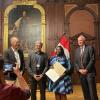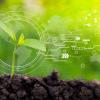
Felicity Addo, a researcher in the IIASA Integrated Biosphere Futures Research Group of the Biodiversity and Natural Resources Program, received an award for her thesis from the Austrian Association for Agricultural Economics (ÖGA) as part of her work on the LAMASUS project.
Addo wrote a thesis on “Assessing Productivity and Efficiency, and its Determinants: The Case of Crop Farms in Austria”
Austrian crop farms face unique challenges due to their small size and natural disadvantages. Addo's thesis delves into the technical efficiency of these farms, revealing that while persistent efficiency is improving, transient inefficiencies remain a significant hurdle. Part-time farms tend to be more scale-efficient than full-time farms, and factors like farm size, specialization, and access to resources are key to success. With technological progress driving the sector forward, it is crucial for farmers to adapt and grow to remain competitive in the long term.
Addo's current scientific interests include agricultural production systems and value chains, food security, sustainable rural development, micro-economic modeling, and agricultural resource management and efficiency.
Adapted from a news item published on lamasus.de
LAMASUS – Land Management for Sustainability
LAMASUS develops an innovative governance model based on collaborative work by policy makers, land users, and researchers. LAMASUS creates an open access modelling toolbox to build sound land use policies in the framework of the European Green Deal.
LAMASUS is a Horizon Europe project working to ensure that the European Union’s climate neutrality target is met. We are creating an innovative modelling system that can anticipate the potential impacts of different agricultural and forestry policies. By using our tools, policy makers can evaluate the economic and environmental benefits of different policies over the mid-term and long-term. This will help to better inform decision making and create a more sustainable future.
News

23 September 2024
Transforming agriculture from carbon source to sink

18 September 2024
The first Forest Policy Modeling Forum convenes in Brussels

22 August 2024
